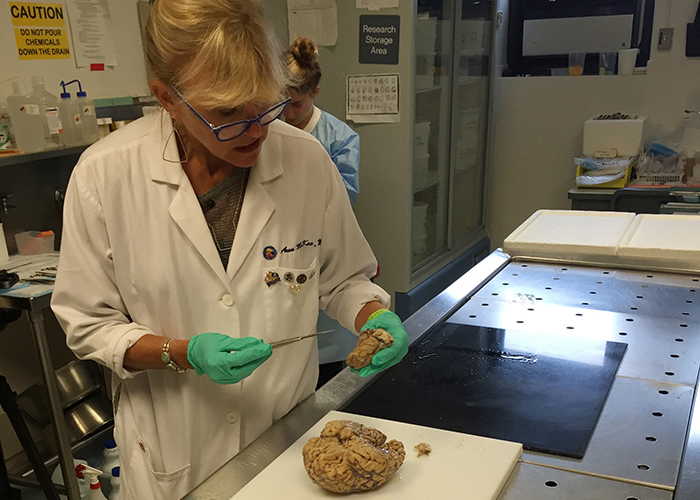The most rigorous study to date examining post-mortem brain tissue from those with PTSD has identified molecular changes in the brain that may lead to new ways to diagnose and treat the disorder.
The study appeared online in the journal Nature Neuroscience on Dec. 21, 2020. Researchers with the VA National Center for PTSD, VA’s National PTSD Brain Bank, and Yale University School of Medicine carried out the study.
`This is a historic step in PTSD research’
“This is a historic step in PTSD research that will mean better treatment for Veterans with PTSD,” says study coauthor Dr. John Krystal, director of NCPTSD’s Clinical Neuroscience Division and chair of psychiatry at Yale University. “We have advanced our understanding of the cellular and molecular alterations in PTSD brains, and this brings us closer to designing more effective treatment strategies.”
PTSD develops in some people who have experienced or witnessed a life-threatening event, and includes intrusion, avoidance and hyperarousal symptoms as well as negative thoughts and mood. Besides psychotherapy, current treatments include medications that researchers say are helpful in minimizing – but not eliminating – PTSD symptoms.
The study, led by Dr. Matthew Girgenti of VA and Yale, is the first to pinpoint genetic changes related to PTSD that are specific to gender, and to certain brain subregions.
Women more likely to develop PTSD after experiencing trauma
Understanding how PTSD differs within the brains of men and women is important, because women are more likely to develop PTSD after experiencing trauma. Also, there may be differences in how men and women respond to treatment. The finding underscores the need to develop different treatment strategies for men and women.
The study also showed major differences in how PTSD and depression look in the brain. Some symptoms overlap between the two conditions, and researchers say that about half of those diagnosed with PTSD are also diagnosed with depression. The finding could potentially help clinicians better distinguish between the conditions and offer more effective treatment.
The findings come from the first major research study using brain tissue from the National PTSD Brain Bank. The bank is led by study co-author Dr. Matthew Friedman of the NCPTSD and Geisel School of Medicine at Dartmouth. The program collects, processes, and stores human research specimens and provides them to qualified researchers to learn more about illness in Veterans.
More Information
Click here to read more about VA research.
Peggy Willoughby is the communications director at VA’s National Center for PTSD.
Topics in this story
More Stories
How much do you know about VA care, benefits and services? Don’t miss out on what you've earned—check out the "2025 VA Federal Benefits Guide for Veterans, Dependents, Survivors, and Caregivers" handbook to learn more.
VA has updated its process for awarding G.I. Bill benefits. This means that many Veterans who served multiple periods of military service (for example, Veterans who reenlisted) may be eligible for additional benefits for themselves or their beneficiaries.
Summer Sports Clinic is a rehabilitative and educational sporting event for eligible Veterans with a range of disabilities.







Very interesting article I am looking forward to reading more as the research continues. I am hopeful there will be some new and effective treatment that will come from all of this. I hope it is not just drugs, but a counseling approach that can give insight into PTSD and alternatives to treatment that work. John Jospeh
EMDR therapy is great! Prescriptions cause more harm than help
This is best news ever on PTSD/Depression. Was diagnosed in 2011 with major depression and PTSD due to 2 major traumas that occurred in service and also TBI .Had 2 suicide attempts after that. Thank you Jesus, I did not succeed. I continue intensive therapy and medication. Better n different therapies are great news. Therapy in the 1970’s consisted of taking an MMPI !!!. WOW! I don’t think PTSD was officially recognized till 1981. Where can I donate my brain to help other vets? I am 67, and a good specimen.
EMDR helps. Prescriptions do not
This is outstanding news and very comforting for those of us with PTSD. Perhaps some truly effective therapies are now on the horizon!
EMDR helps. Prescriptions do not